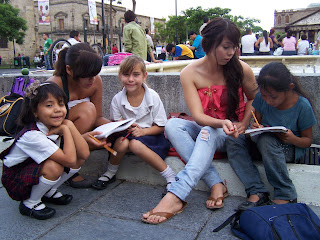
For a lot of people de concept of “Kids in street situations or child laborers” is unfamiliar. However, according to the publication "Breaking cycles of poverty with educational interventions: the Case of CODENI" by Danielle Strickland (2010), the last census that DIF Jalisco published in February of 2008 reported 3,674 minors working in the public street in the metropolitan area of Guadalajara. These children and adolescents can be seen all over downtown, selling what they call “seasonal products”, working as magicians, selling potato chips and candies, sometimes alone and sometimes with relatives. A significant group of child laborers arrives every day from the highly marginalized peripheral neighborhoods of Guadalajara, returning to their shanty homes only to sleep at night.
It is important to mention that the children and adolescents that are considered to be “in street situations” are those who live in poverty and forced to the streets for survival. This concept refers to a wide range of children and teenagers, including those who accompany their parents to work as informal vendors in the streets to those who sleep in public spaces.
The working children and adolescents that participate in CODENI generally accompany their relatives. They generally work to help the family economy or help sell in the streets while their parents do other activities. From a very young age they have autonomy and freedom, including economic activity and the capacity to move freely in the city streets. That said, these children live with their families and usually attend school. The common characteristic of CODENI´s families is the lack of formal jobs and stable income.
The children and adolescents who participate in CODENI do not perceive themselves as vulnerable or recognize rights violations in their lives. Life on the streets is the norm for these families and they have not experienced other ways of life. They perceive their lives as normal and do not believe that the necessity to work as children is a rights violation. Many consider themselves to be “middle class,” since they are better off than those living on the streets. However, CODENI strives to broaden their perspective and consider a more stable future, with formal employment off the streets.
The benefit of working on the streets is the lack of structure in their work day and access to easy money, as the work requires no application process or requisites. This means that they can count with economical fluency, with a daily cash income that allows them to purchase goods and go to the arcade, for example. The sensation of having cash in their pockets makes street work attractive to these children and families and often inhibits them from seeing the benefits of working to obtain formal employment with legal benefits and a stable income.
Despite the economic benefit of working on the streets, children and teens in street situations are victims of many rights violations and are constantly exposed to risks such as drug trafficking, sexual exploitation and discrimination. We must remain conscious of the rights violations that street children and youth suffer as they are indeed the present and our hope for a brighter future for Mexico.
By: María Luisa Romero Rodríguez, CODENI “Workshops coordinator”

No comments:
Post a Comment